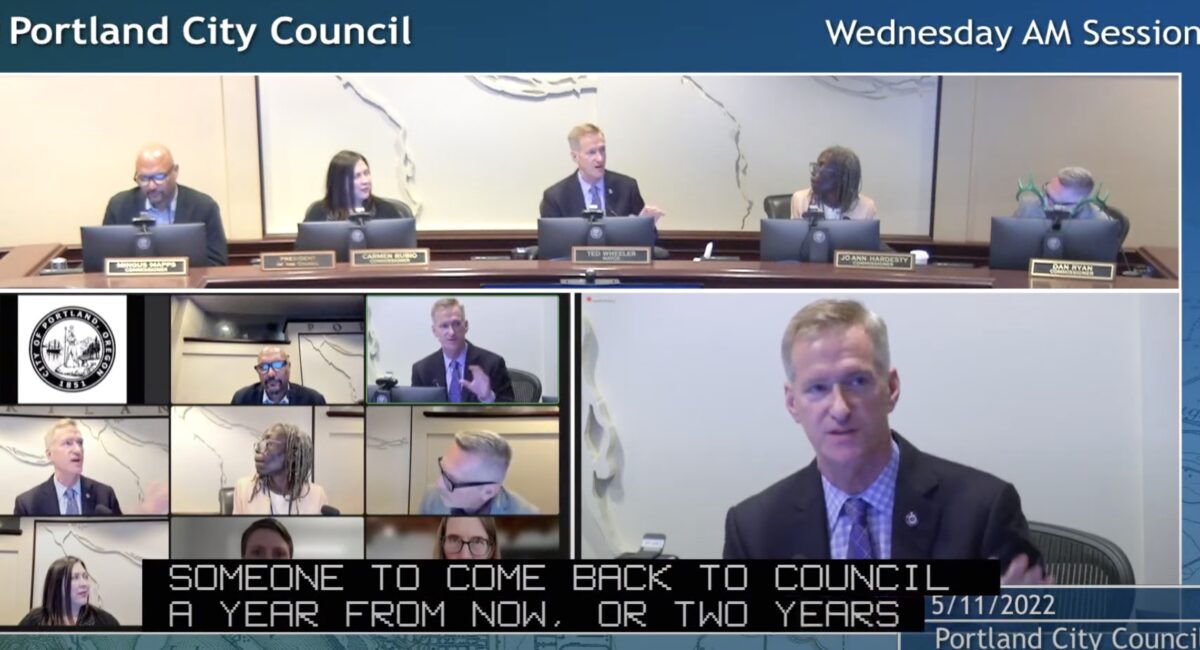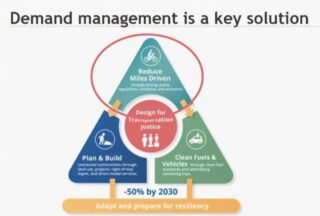
What was expected to be a boring council agenda item about Yet Another Plan (YAP, I’ll explain later) from the transportation bureau on Wednesday turned into a revealing exchange between Mayor Ted Wheeler and Commissioner Jo Ann Hardesty about how to approach the city’s efforts to reduce driving in the central city.

The Portland Bureau of Transportation completed their “Way to Go” plan late last year and this week it was up for official adoption by city council. The 78-page plan is part of PBOT’s TDM, or transportation demand management, strategy. When it comes to TDM at PBOT, it’s really just a nicer way of saying “We need to reduce driving.” The “demand” they’re trying to “manage” is the tendency of way too many Portlanders to hop in their cars when they make a short trip.
PBOT is one of the best agencies in America at doing TDM and the Way to Go plan is the first time they’ve put their extensive insights about how to reduce driving into one document. It also comes on the heels of the landmark Pricing Options for Equitable Mobility initiative and with considerable bureaucratic momentum to finally create more sustainable revenue sources.
Long story short: Making it more expensive to drive and cheaper to take transit and other modes isn’t a matter of if in Portland these days, it’s a matter of when. So when Mayor Ted Wheeler openly questioned the key takeaway of PBOT’s report, there were a lot of raised eyebrows and I think I heard even a few jeers from council chambers (meetings are now in person as well as online).
Here’s how it went down…
Advertisement
“It sounds a little bit tone deaf compared to the other efforts we’re currently working on to see our city recover economically.”
— Ted Wheeler, mayor
“We will be forced to make hard choices… We cannot let [economic] recovery be at the expense of climate mitigation.”
— Jo Ann Hardesty, commissioner
The head of the city’s Active Transportation and Safety Division, Catherine Ciarlo (a former executive director at The Street Trust), opened up the presentation with a refreshingly candid remark. “A recent NY Times story asked us, ‘Can Portland be a climate leader without reducing driving?’ and unfortunately, the data says we can’t… We are not on track to do that and carbon emissions from transportation are increasing, not decreasing,” Ciarlo said.
PBOT’s presentation then made it clear their top recommendation for how to manage demand is to price car trips — by doing things like charging to enter a “congestion zone” or raise parking fees — and then use that revenue to subsidize other forms of travel and build biking and walking infrastructure.
But while it’s an exciting plan full of solid policies, the elephant in the room is that PBOT has lots of exciting plans full of solid policies
“I’m going to call it a YAP, yet another plan,” said Portland Parking Reform leader Tony Jordan during his testimony, where he also said PBOT has too many “YIPs”, or not Yet Implemented Plans. “We’re like a kid trapped on a diving board trying to get psyched up to jump off producing yet another plan after yet another plan.” Jordan made made a plea for city leaders to act with more urgency and implement some of the transformational policies instead of just talking about them. “It’s time to stop YIP-ing and YAP-ing and start acting on these plans,” he said.
Not even five minutes after Jordan’s comments, Mayor Wheeler wanted to make sure the plan wouldn’t actually take any actions. “I want to be clear for the record that if I vote for this resolution, I’m assuming every component of this program comes back to the city council prior to being funded. Is that accurate?” he asked PBOT Commissioner Jo Ann Hardesty. And she clarified that, “We’re not asking you to fund our plan. We’re actually asking you to accept the vision about where we think we’re going.”
That was a fair question for Wheeler to ask, but he didn’t stop there. He asked another question that revealed his opinions about transit and concerns for PBOT’s assumptions around changing driver behaviors.
“There are significant assumptions around personal behavior. And since this plan is rooted in equity — and since we know that lower income Portlanders are being displaced to the farthest reaches of our city and even into Gresham — a decision that one would make individually to not drive into the city would in large measure be dependent upon there being a good alternative. And as of today, there is not a good alternative. I hope I’m not offending anybody when I say that about a regional public transit system that would not support wide-scale mobility migration to public transit, as it currently stands.
Are we working with TriMet? Are we somehow coordinating this strategy of, quote, ‘disincentivizing personal vehicle use’ and at the same time, creating a viable, reliable alternative? Because right now that reliable alternative doesn’t exist. So I think it’s asking a lot for people to abandon their vehicles if the only way they can get to work or get their kids to school is with a vehicle.”
Advertisement
Wheeler has been in office for six years. He should know that his city works closely with TriMet on a number of programs and projects (Division Transit Project, Rose Lane Project just to name a few). It’s also jaw-dropping that he’s insinuating PBOT hasn’t been doing enough to build up non-driving infrastructure or that he would speak ill of transit in order to advocate for people to continue to drive at the same rates they do today.
The mayor’s tone (which was borderline annoyed and angry) and questioning sounded very familiar to me as someone who’s observed people for years who get very uncomfortable at the idea of changing driving habits. He sounded much more concerned that PBOT (which is overseen by Hardesty, a fact not lost on anyone who understands politics in Portland) was trying to take away his car, then he did about making sure alternatives to driving exist.
To be clear, there’s no policy on the table that is asking people to “abandon their vehicles”. The idea is merely to consider ways to make driving more expensive for people who choose to go to certain parts of the city at certain times and to glean more revenue from driving in general — both of which are very reasonable, necessary, and effective policies.
After Commissioner Hardesty responded to Wheeler by outlining ways her bureau is making alternatives better (like expanding Biketown, investing in transit and rebuilding 82nd Avenue), the mayor dug in even deeper. He insinuated that PBOT’s efforts to reduce driving in the central city would have a negative impact on economic recovery.
Here’s his comment:
“This is one area where I think it is critical that we communicate with all of our bureaus in our community partners around the economic recovery of the city. Our city is not recovered. And we are spending a considerable amount of time through our economic development efforts to get people to come back to the central city, in encouraging people to shop, to enjoy our public spaces, and recover from both the social and the economic impacts of the pandemic. And I want to make sure that as we talk about increasing the cost of being able to come to the central city, we’re not working against our own interests in terms of helping small businesses in particular recover from the pandemic.
As I hear this presentation, while it’s a good strategy to combine incentives with a regulatory approach to achieve our long term climate goals, it sounds a little bit tone deaf compared to the other efforts we’re currently working on to see our city recover economically.”
It’s important to watch the video. From my eyes and ears, Wheeler is doing more than making a comment. He sounds mad. Hardesty must have felt it because she equaled his emotion in her response:
“I really appreciate your statement and let me just say climate change is real. And what we’re rebuilding coming back must address the fact that the climate is dying. And if we don’t act radically, we will not actually have an impact on that in our lifetime. And it’s not mutually-exclusive to coming back economically…
This is not about a punitive behavior. This is about acknowledging that we’re in a climate crisis and we must change behavior if we’re ever going to get out of it.
… let me leave you with no doubt: We will be forced to make hard choices because we can’t continue to do what we’ve always done and somehow expect different outcomes. Or we can actually set a vision about where we’re headed. I’m all about setting the vision for where we’re headed, not actually reinforcing things that are killing our planet. So I am very happy to vote aye on this… We cannot let [economic] recovery be at the expense of climate mitigation.”
It was a very important exchange on the policy substance, and downright fascinating from a political standpoint.



